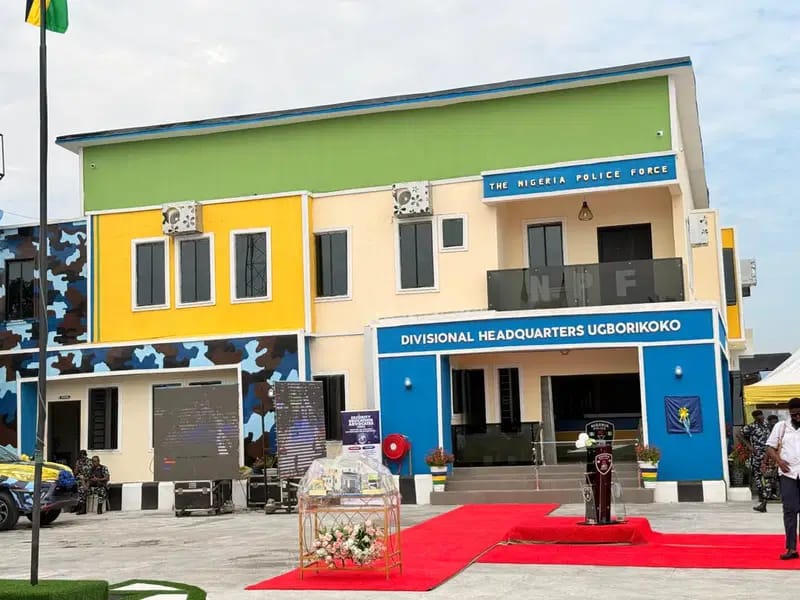In the undulating, oil-rich expanse of Nigeria’s Niger Delta, a region as famous for its natural bounty as for the turbulence that has often accompanied it, history performed one of its stranger pirouettes last Friday. A state-of-the-art police station, reputedly the most modern in Nigeria, rose in the Ugborikoko community of Delta State, a multimillion-naira edifice equipped with CCTV surveillance, digital systems, a 30kva soundproof Mikano generator and a 30kva solar system to ensure uninterrupted power, as well as television sets, and air-conditioning detention cells. Its benefactor? None other than High Chief Government Ekpemupolo, better known to history and Nigeria’s security annals as Tompolo; the once-dreaded commander of the militant Movement for the Emancipation of the Niger Delta (MEND).
Tompolo’s earlier years were characterized by militant activities aimed at drawing attention to the plight of the Niger Delta. Under his leadership, MEND orchestrated numerous attacks on oil infrastructure, including the 2008 assault on Shell’s Bonga oil platform, which temporarily halted 10% of Nigeria’s oil production. Such actions were part of a broader campaign to disrupt oil operations and demand greater resource control for the region. However, in a remarkable turnaround, Tompolo has transitioned from chief insurgent to security provider. The irony could not be more exquisite.
Tompolo, a man who once stood defiantly against the Nigerian state, whose name was synonymous with pipeline sabotage and maritime insurgency, now positions himself as a patron of law enforcement – the very apparatus he spent years attacking and undermining. Through Tantita Security Services Nigeria Limited (TSSNL), the private security firm he chairs, Tompolo has not merely donated a building; he has erected a monument to redemption, a public relations coup disguised as philanthropy and corporate social responsibility. The police station now stands as a symbol of reconciliation and a commitment to peace and development in a region that has long suffered from neglect and violence.
Tompolo’s pivot from militant commander to security magnate has been as swift as it has been profitable. Since securing federal contracts to protect oil infrastructure, the lifeblood of Nigeria’s economy, TSSNL has uncovered numerous illegal tapping points used for crude oil theft and overseen a dramatic upswing in oil production, from an anaemic 700,000 barrels per day to 1.7 million. This shift not only underscores Tompolo’s personal transformation but also highlights the complexities of addressing security challenges in the Niger Delta. The tale, so steeped in paradox, would make the Greek tragedians envious.
The unveiling of this police station was marked by elaborate ceremony and saccharine speeches. Inspector General of Police Kayode Egbetokun, represented at the event, declared it a testament to the enduring partnership between security forces and community leaders. Delta State Governor Sheriff Oborevwori’s emissary hailed it as a symbol of a safer future. And yet, beneath these official declarations lies a deeper, unresolved tension: a nation so hollowed out by decades of corruption and institutional frailty that its security apparatus now leans on former insurgents for survival.
The Ugborikoko Divisional Police Officer, CSP Omosetemi Agbede Zuokumor, spoke movingly of inheriting a dilapidated station unfit for the officers within. That it required the intervention of a figure like Tompolo to address such a glaring deficiency, lays bare the grim arithmetic of Nigeria’s governance, where public goods arrive not through state efficiency but through the patronage of those who once threatened it.
Tompolo’s journey from militant leader to a proponent of law and order reflects the potential for change and the importance of inclusive approaches to conflict resolution. While his past actions had significant economic and environmental impacts, his current endeavors contribute to the stabilization and growth of the Niger Delta. This transformation also raises broader questions about the role of former militants in peacebuilding and the integration of non-state actors into formal security frameworks. As Nigeria continues to grapple with complex security challenges, Tompolo’s story offers insights into the possibilities and pitfalls of such transitions.
This act of magnanimity should therefore be viewed in its full complexity: part redemption arc, part transactional necessity. It is a poetic irony of post-conflict Nigeria — a nation where yesterday’s insurgent, reborn as today’s benefactor, commissions police stations to secure the same communities he once set ablaze. In the Niger Delta, the circle, it seems, always finds a way to complete itself.





